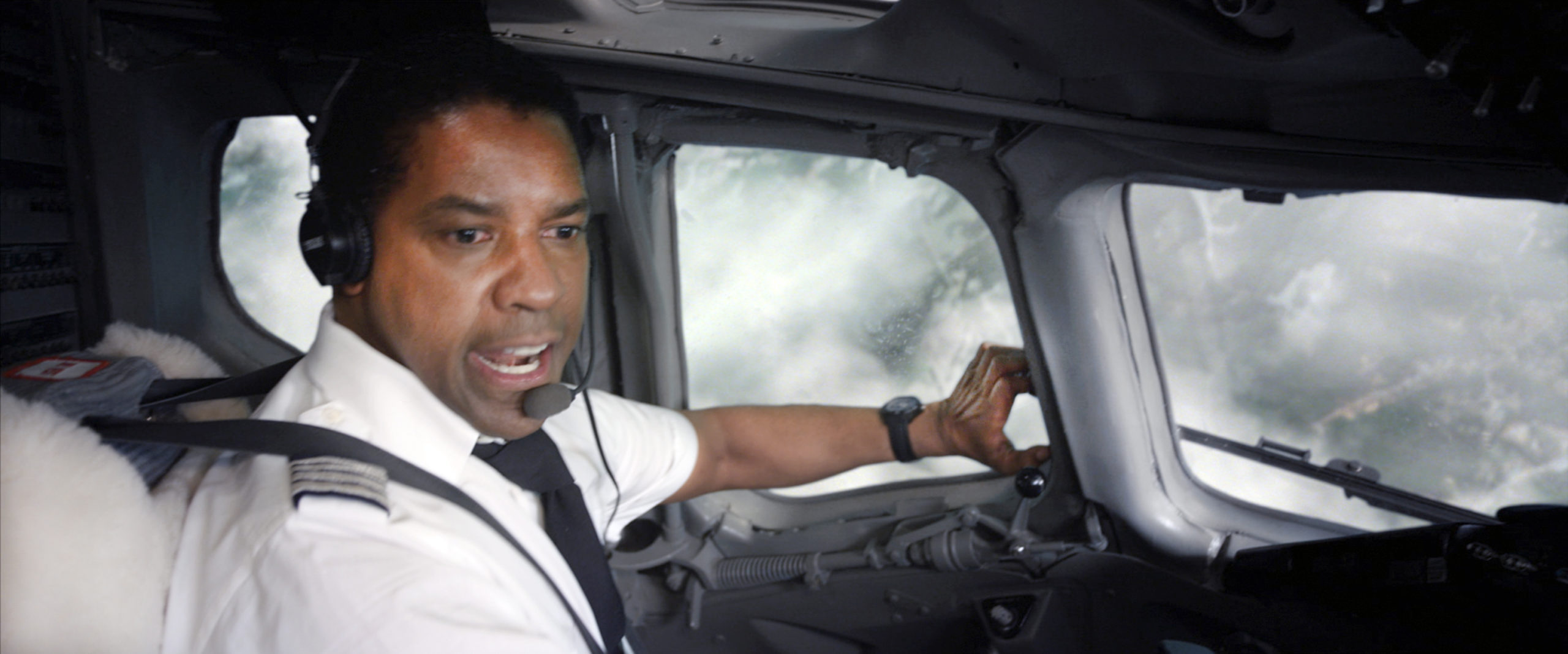The opening scenes of Flight tell us everything we need to know about Whip Whitaker (Denzel Washington), a middle-aged, coked up alcoholic who happens to be a respected commercial airline pilot. He’s just had a wild binge of sex and substances with a pretty flight attendant (Nadine Velazquez) whom he thinks he’s falling in love with until a phone call from his ex-wife demanding child support dampens the party. He guzzles Scotch and snorts a few lines—before heading to the cockpit.
It should be said that a fair reaction to Flight, directed by Robert Zemeckis, might be to stay off planes indefinitely, given that it begins with an absolutely terrifying sequence where Whitaker miraculously takes the aircraft through stormy weather before a tail flap malfunction triggers a rapid nosedive—which he recovers from by flying the plane inverted and landing on its belly in a field, saving 96 of the 102 lives onboard. He may be out of control on the ground but up in the air he’s a lifesaver. He’s drunk, but almost everyone made it. He’s a hero, right?
Not quite. This isn’t a “Miracle on the Hudson” story, but rather a hard-nosed drama about an addict who can’t hit the bottom, even after crashing into the Earth headfirst. Washington, the always-dependable star with two Oscars seems again headed to the finish line. It’s a difficult performance as a character we don’t always like, even when we feel great empathy for him.
Whip awakens in the hospital to find that Katerina (Velazquez) died in the crash, and a union rep (Bruce Greenwood) and slick city lawyer (Don Cheadle) at his side. Everything illegal in his system has been found, of course, and their aim is to clear keep him out of prison, a very real possibility given that his surviving crew members—a novice, God-fearing co-pilot (Brian Geraghty) and a loyal attendant (the excellent Tamara Tunie) seem poised to tell what they know.
In the hospital he meets a down-on-her-luck heroin junkie played by Kelly Reilly in a major performance; one of those hard-living, worn-down beauties weary before her time. The pair have symmetry and move in together, but are doomed as she’s not using anymore—and Whip has no desire to go straight. What emerges in Flight is a character study of a man self-destructing; he’s saved the plane but he’s crashing inside.
So there are no easy wins here for Whitaker, and Washington is clearly in his element as a guy with a rock-solid moral core, a father cast out of his family, a guy medicating himself 24/7 and a person with no good options—he can admit his fault and go to prison, shift the blame to a deceased crew member or continue drinking—and the screenplay tests him in a terrific late scene where Melissa Leo commands the hearing proceedings like a cruise missile that goes off trajectory after an unexpected revelation.
The final, quiet scenes are more than sad, including a one between father and estranged son (and no one does these better than Washington, a mentor extraordinaire in both Antwone Fisher and The Great Debaters) that ends on a perfect line of dialogue.
At times Flight feels absolutely radical in its avoidance of the clichés we think are coming—Whip being redeemed by the love of a good woman, grandstanding in a climactic hearing, walking the twelve steps—but we’re happily surprised when none of those elements snap into place.
Indeed even when we think we know where Flight is going as when Whip cleans up for the big NTSB hearing, the picture surprises us again, with a very funny John Goodman providing coke as an upper, or equalizer, to a body sloshed with booze.
Flight is built on Washington’s brave performance—the kind of character-centered film Hollywood rarely has patience for these days, and Zemeckis and company deliver a believably flawed character worth caring about.
3 1/2 stars.



